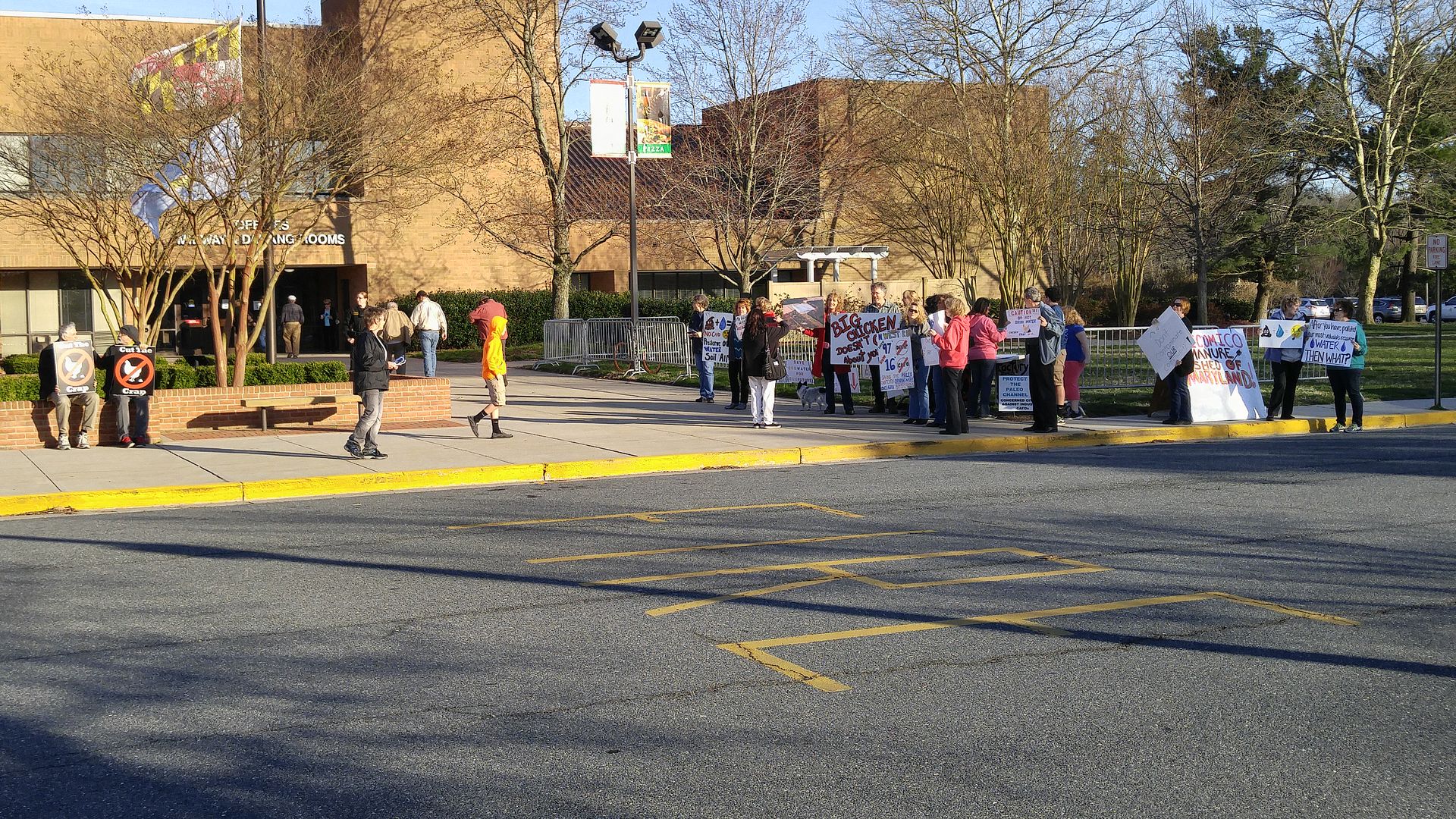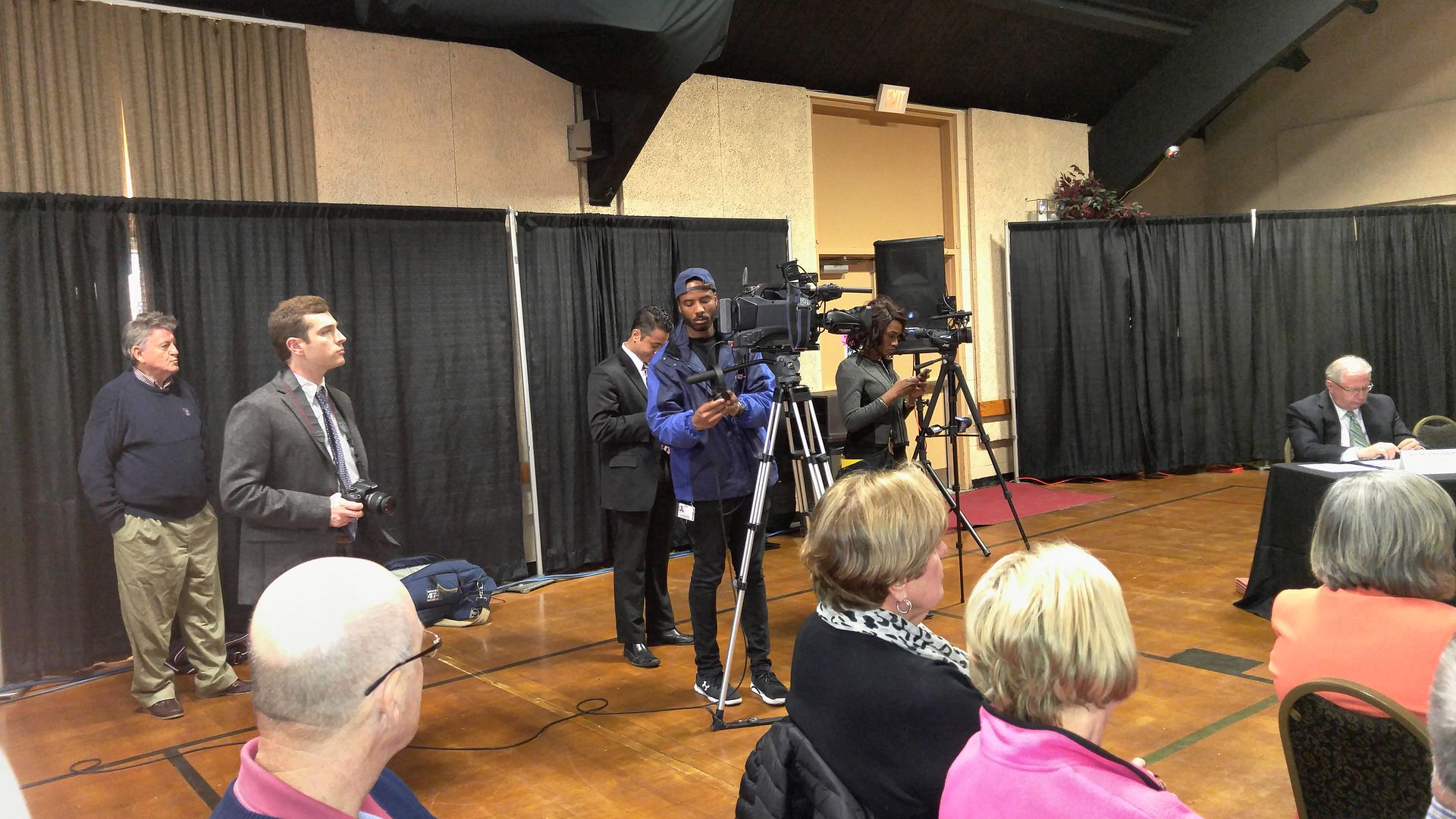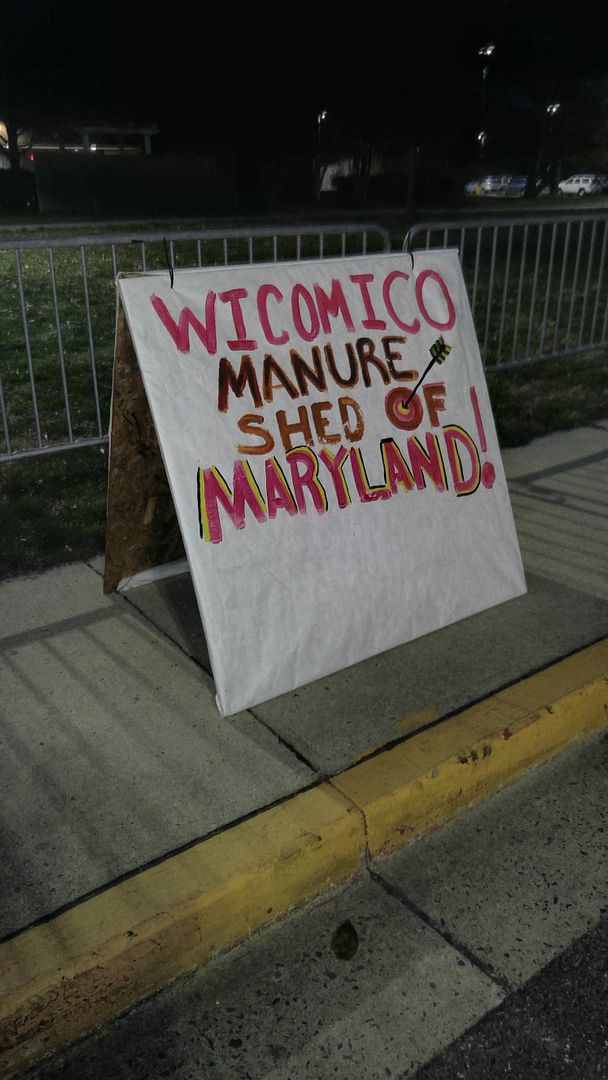As I noted in my original coverage last Wednesday, I received the opportunity to have a one-on-one interview with gubernatorial candidate David Craig after he concluded his public remarks. Rather than ask him strictly about his stump speech, I wanted to ask about some of the topics which may be more important to my fellow Eastern Shore residents.
**********
monoblogue: Just to ask you the first question, I know we’re the seventh stop or so on this tour…
Craig: Yes.
monoblogue: …so how’s your reception been?
Craig: It’s been very good. Started out good – a little rainy when we started out…
monoblogue: Yes.
Craig: …but good crowds everywhere we’ve been, the people who showed up have been very receptive (and) very happy about what was happening. Very impressive in Hagerstown, we got out there and did the walking tour of downtown and went in to see several businesses, went by the schools…a lot of people saw the bus, they saw me, and they started walking with us. Got a little reception afterward where people could just come in and talk about stuff.
We went to Silver Spring – how many Republicans are going to go to Montgomery County? But we drive through the neighborhoods and I think, “Why are these people voting for Democrats?” These people have their nice little homes, they obviously have nice jobs and stuff like that, paying income taxes…
monoblogue: Well, the problem is they may have government jobs that depend on the government being large.
Craig: Well, they may depend on the federal government being large but not us. Anyway, it’s nice neighborhoods and things like that. The one in Prince Frederick was very good, Annapolis was Annapolis (laughs)…that was fun. So they’ve all been very interesting, you see the differences – everybody says one Maryland, but there are slight differences.
monoblogue: Yeah, well, for example I come from a rural perspective – I grew up in a rural area – and I know you talked in your speech about the lost balance between environmentalism and that. How’s that going to affect our “outhouse” out here?
Craig: (laughs) You tell people that farmers were the first environmentalists that we ever saw. Farmers are usually pretty fiduciary – they usually don’t waste money.
monoblogue: No, they’re trying to make money.
Craig: They’re trying to make money, so they’re not going to do things that are bad. What I’ve found in doing this in Harford County is I do have an executive – I have an Agricultural Economic Advisory Board and I have an Agricultural Preservation Board that I work with, and one of my deputy chiefs of staff is the agricultural deputy chief of staff. What I’ve found is the best way is to actually listen to the farmers have to say and have them come up with solutions for what they think needs to be done, and then convince the other farmer this is the best way to go – it’s not government talking to you. (They’d say) I did this on my farm, it saved me money, it did this and saved me all these rules and regulations.
But we get all these people that are in environmental services, they have this job, they’re lawyers, they’re environmental – but they know nothing. I had a situation talking with the Maryland Department of the Environment, I said give me an example of this rain tax, I have two – or septic tax. I have two farms, tell me which one’s the worst. How will I be able to determine which one – one guy’s doing the good job, one’s a bad job? And the guy looked at me and said we can’t figure that out.
monoblogue: Well, that’s reassuring. After they passed the septic bill and they can’t tell you that? I know there was a bill – and it was one of our Delegates (Mike McDermott) put it up – to rescind that entire septic bill. Now, if it does somehow get through the General Assembly would you consider signing that bill rescinding the law?
Craig: I think there are many things that have been done over the last 20 years that ought to be rescinded, particularly when it comes – what was the one Parris Glendening did? I can’t remember, it was some kind of infectious disease thing…
monoblogue: I don’t know, it was before my time.
Craig: Anyway, they came up with all these ideas – for them it’s always about what’s the headline, what’s the media going to report in the next 90 days – after it gets done, do they ever go back and evaluate what the bill did, and whether it was effective? You know, William Donald Schaefer was the one who put the Critical Areas section in – I was the mayor, I had to adopt Critical Areas legislation in the city of Harve de Grace or no building was going to be permitted. I had to actually impose a tax, I was the first one to pay it because I was the first one to go for a building permit. And they kept saying, we need 1,000 feet from the bay to be doing this. And I would say we’re not the only ones polluting this, you think it’s just us, why are you doing this to us? And does it actually solve things? If I have someone who rebuilds something and fixes it up, isn’t that better than just letting it sit there the way it is? Let’s come up with real solutions for what needs to be done. Did the critical area and the critical area tax solve the Chesapeake Bay problem?
monoblogue: No. And the problem is they keep moving the goalposts…
Craig: Yes! And they’re made up – that’s the thing, the numbers are made up. Who came up with the idea a football field had to be 100 yards? Why couldn’t it be 120 yards, why couldn’t it be 90 yards? You know, it’s like – first they make a number up, I’ll give you this example. I was the mayor of Havre de Grace, we get hit with this issue with our sewage treatment plant that we have to do this change – $9 million it costs us to upgrade the sewage treatment plant.
A week later, the rules and regulations were changed. They came back and said, this is no longer functioning the way we need it to function, now you need to do this – $47 million. Here’s the problem, the analogy I use. Let’s say you decided to redo your kitchen – new refrigerator, new stove, new microwave, you buy new ones, you put them in there, spend $4,000 – and then you come back home, no I think we need to rip the whole kitchen out and you throw away those appliances. None of that $9 million was good enough to maintain the $47 million, so we wasted the $9 million. We’re still paying – the people of Havre de Grace are still paying…
monoblogue: Salisbury has the same problem, they’re messing around with their sewer treatment plant.
Craig: Yeah, so they keep changing the concept of what’s going on, and they don’t really look at real solutions. And if someone comes up with a real solution that’s not what the government wanted, then they ignore it.
**********
At this point, we were interrupted by a well-wisher. When we got back to the conversation, I changed the subject.
**********
monoblogue: You also talked about the – all the tax increases we had. I love how you used all the Change Maryland numbers, that’s great. I said I could tell Jim Pettit’s on his staff now…
Craig: Well, we’ve got them for a variety of things but when Larry Hogan started Change Maryland we talked about it and said, you know, I might run, I might not run, but if I don’t run Change Maryland’s going to go with you. And I’d like to admit that Larry’s done a good job getting that information out…
monoblogue: He does.
Craig: …and persuading people. I think in the long run Larry realizes that he’s making more money (laughs) being a private worker…
monoblogue: Oh yeah.
Craig: …and I think ultimately he stays there. But he can he huge in helping us reform the state party.
monoblogue: Right. But is there any chance we’re going to see some of that stuff rolled back if you’re elected?
Craig: I will look at all of them. But if somebody says “which tax first?” I’m going to look at all of them. There are certain taxes that probably haven’t been on the table that people said, would you ever get rid of this? If the state says that we’re going to make – we have a Public Service Commission to keep your BG&E rate as low as possible, why do we tax it? Why do we tax it? If we got rid of that, it gets rid of $5 on your BG&E bill every – well, it would save you 60 bucks. And guess what? You’re probably going to spend it somewhere else.
monoblogue: Well, that’s the idea. It’s where YOU want to spend it, not where the state wants to spend it.
Craig: You know, sales tax…I go back to that Calvin Coolidge thing with lowering the income tax, if you lower the sales tax more people would buy stuff here and it increases what gets sold. My wife’s not dumb – we live 17 miles from Delaware. You’re going to buy $4,000 worth of appliances times 6 – you do the math…
monoblogue: And seven miles from Delmar – if you go up 13 you’ll notice all the big-ticket items, furniture stores…
Craig: Yeah, look at the ads, look at the ads. I mean, I was looking at ads this morning on the TV when I was here and it was like – I forget what the particular issue was they were selling, and they go “in Delaware, no tax.” You know, it’s like – and how far away are you? Cecil County last month, in May, had twelve liquor stores give up their licenses…
monoblogue: Yes.
Craig: …and close. And they did it because, if you live in Elkton in five minutes you could be in (Delaware), you can buy your liquor, you can buy your gasoline, you can buy your cigarettes. All that tax is lower or non-existent and we got nothing. And so, I don’t know how many people but say each had three business people – so 36 to 40 jobs gone?
monoblogue: Right.
Craig: And all because “oh, it’s an alcohol tax, it’s okay to raise it.”
monoblogue: And the same thing is true (for cigarettes), because I go to Virginia for my job every week and driving back into Maryland the last convenience store I see – “Last Chance for Cheap Smokes.”
Craig: That’s right.
monoblogue: Because Virginia’s tax is, like, thirty cents and ours is two bucks.
Craig: And if I throw out the issue of the corporate income tax, people are like “oh, you’re only for the rich people.” All right, I’ll throw out other issues: Harford County, a lot of military people stationed there, when they get done they retire. They move to Pennsylvania because their military pension is taxed. We shouldn’t tax a military person’s pension, they already made their sacrifices. So let them live here in the state of Maryland.
monoblogue: I think they have tried to do that a few times, and the legislature just doesn’t go anywhere.
Craig: Well, they haven’t gone with it because they haven’t been told to go with it. If the governor had said go with it, they would have gone with it.
monoblogue: That’s true, it’s usually Republicans who bring it up.
Craig: Well, you know, I think if enough veterans were showing up and saying – what was this whole thing about the governor pointing out and bragging about what he was doing about creating jobs for veterans, about a month ago? Remember he was changing some policies, it was going to make it easier for them to get a job?
monoblogue: Right.
Craig: Why would they want to come here and get a job and pay a higher tax on their pension that they also get and then a higher tax on their income tax? So, we need to change the income tax…(also) the death tax is ridiculous, somebody in your family passes away, they pay taxes on that money for their entire life – why are you paying a tax to inherit it? If they were smart I guess they should sell everything and give you the money before they pass away. But people leave the state all the time, go to Florida, no tax, go to Pennsylvania, don’t have to pay that tax.
The gas tax – I do tell people I have to be cautious to (not) say I’m going to get rid of this tax or lower this right away because – I’ll have to use the septic tax for an example – when Ehrlich was governor the septics were all done through PAYGO, so he didn’t have capital projects. This governor turned it to bonding, so if I’m stuck with paying off a bond I’ve got to do that first before I can get rid of the tax.
monoblogue: Right, exactly. I’m sure he’s created a few mousetraps for his successor to deal with if they want to change things. It’s going to be harder to undo this Gordian knot then most people would think.
Craig: And then they brag about, oh, we’re going to do this private-public partnership, this 3P thing, it’s like – most likely that’s not going to work. If you look at something that’s going to be a good financial thing with some private company coming in and doing something, they probably could have done it if they didn’t have to pay the minimum wage, if they didn’t have to pay the union fee, if they didn’t have to deal with the minority business stuff – you could probably lower the prices of those projects by 35 percent. Stephanie Rawlings-Blake just gets a billion dollars for school construction, well, $300 million of that is going to be wasted and she could have had it – that would have done how many more schools for her?
monoblogue: Exactly.
Craig: So which is better? Is it better to have a good school for the kid, or you created this “fake” job?
monoblogue: Right. I remember, being from Ohio, when Ohio built all its schools they actually eliminated the prevailing wage for schools just to get more bang for the buck.
Craig: Yeah, that’s what you should do. Period.
monoblogue: Speaking of education, I liked how you tied in the lack of – lack of academic achievement with our so-called “number one” ranking. Now where do you – where do you prioritize your spending to bring up the actual achievement and not necessarily worry about being “number one” in the country?
Craig: A couple things. There’s a lot of duplication that we could…a lot of duplication. Here’s the situation in Harford County. Since I’ve been County Executive, the size of the school board employees has increased by 650 employees. The school population has declined by 2,500 students. Why didn’t the size of the working staff decline?
Now, if they had had 2,300 new students move in they would have come to me and said, “we need 100 new teachers.” But when 2,000 went down they didn’t say, “well, we didn’t need 100 teachers anymore.”
monoblogue: No.
Craig: So we have that situation, and I get teachers complaining to me all the time, “well, you know, the size of the class has gone up.” If you’re a good teacher, it doesn’t matter how many kids you’re sitting in the class. The first year I taught, 39 kids in the class. Second year, 42 kids in the class. Forty-two. I didn’t even have enough desks for the kids; one of them had to sit at my desk and one of them had to sit at a table. So when they say there’s 23 kids, the fact is, studies have been shown that the change does not occur until the size of the class falls below 15. So that’s what you’re going to do, if you say we’re reducing the size, we’re going from 24 to 23 – so what? If you’re a teacher, you can’t teach 24, can’t teach 25? That’s one thing.
But there’s duplication, so much duplication, in government – county government and school board government. I have a capital projects committee, they have a capital projects committee – why do we need both? I have the same guys that do the investigations, the inspections and all that stuff, I have a procurement department. I don’t buy chalk and all that stuff, but they have a procurement department. That’s duplication. I have a lawyer, a law department, they have a law department – duplication. They have a human resource department, I have a human resource department, duplication. Now, do I get rid of all those employees? No, but at least get rid of the top person. The person who’s making $150,ooo, instead of having two of them, you only have one. And you can probably merge a lot of things together and only have office – and none of that takes place in the classroom.
monoblogue: You need to think about that at the state level, and not necessarily the county level – I mean, if a county wants to do that, that’s fine and dandy, that’s their money. At the state level is where you’ll be concentrating…
Craig: Yes.
monoblogue: …I would think we need to rightsize the state Department of Education…
Craig: I agree.
monoblogue: …because the localities should control anyway.
Craig: Yes they should. Yes they should. And it has grown exponentially. And if you look at higher education, when I was in the House I was always assigned the higher education budget and you look at a college that’s got nine vice-Presidents – why? We only have one Vice-President in the country, yet nine in a college? Come on! And are they teaching? No. You know, all these different people, you have all these professors that are teaching one class, maybe two classes. I had someone, when I was doing a debate one time, who said “what are you going to do about the cost of higher – you know, how much my education’s going to cost?” We need to reduce it on our size – on our side, for one thing. We’re forced to spend this money on that, it doesn’t need to be spent.
So there’s a lot of duplication in both higher ed and elementary through high school at the state level that I agree we could change.
monoblogue: Okay, I appreciate it.
Craig: Thank you.
**********
Ideally, I wanted to come in about 15 minutes and with the interruption that’s about where I ended up. Hopefully this establishes some of where David Craig stands on various issues.





